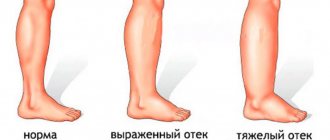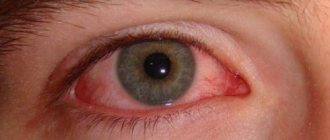What is leg swelling
Swelling of the legs is an external manifestation of the accumulation of fluid in the body. At the same time, the limb itself noticeably increases in size, the skin on it becomes loose, and when pressed, dents appear that do not disappear instantly.
Swelling usually occurs in the evening, although it can still cause discomfort the next morning. It is localized:
- in the feet;
- in the ankles;
- in the legs;
- from socks to knee.
Depending on the reasons, either one leg or both may swell. Symmetrical distribution often indicates generalized edema, which may be a symptom of a life-threatening condition.
If this trouble appears rarely, then you can fight it with folk remedies. The regularity of occurrence indicates a disease of the internal organs. Therefore, it is important to establish the nature of the swelling.
Diuretics: what are they?
Diuretics are medications that speed up the formation of urine and its elimination from the body.
Such drugs are prescribed primarily to combat tissue swelling due to diseases of the cardiovascular system, kidneys and liver, as well as to treat severe pathological conditions that require rapid fluid reduction.
All diuretics differ in the mechanism of their diuretic effect. The pharmacological property of the drugs is their effect on the epithelium of the renal tubules, where urine formation occurs.
In addition, some medications affect certain enzymes and hormonal substances that are responsible for normal kidney function.
Causes of leg swelling
When there is too much fluid in the tissues, it means that there is a malfunction in the functioning of the body. Most often, swelling is caused by:
- protein metabolism disorder;
- damage to cell membranes, increasing their permeability;
- changes in pressure differences in tissues and vessels;
- impaired blood circulation.
There are many reasons for such failures. Some are temporary (allergic reaction, bruise, infection). Others indicate the development of pathologies of the lower extremities (varicose veins, thrombophlebitis). Still others indicate serious diseases of the internal organs (heart, kidneys, lymphatic system).
A person cannot independently determine why his foot is swollen: because of uncomfortable shoes or because of a blocked blood vessel. Therefore, you should not postpone a visit to the doctor for subsequent treatment.
Side effects
From the gastrointestinal tract: nausea, vomiting, diarrhea, ulceration and bleeding from the gastrointestinal tract, gastritis, intestinal colic, abdominal pain, constipation.
From the liver: impaired liver function.
From the nervous system: ataxia, lethargy, dizziness, headache, drowsiness, lethargy, confusion, muscle spasm.
From the blood and lymphatic system: agranulocytosis, thrombocytopenia, megaloblastosis.
From laboratory parameters: hyperuricemia, hypercreatininemia, increased urea concentration, disturbance of water and electrolyte balance (hyperkalemia, hyponatremia) and acid-base status (metabolic hyperchloremic acidosis or alkalosis).
From the endocrine system: deepening of the voice, in men - gynecomastia (the likelihood of development depends on the dose, duration of treatment and is usually reversible, and disappears after discontinuation of the drug, and only in rare cases the mammary gland remains slightly enlarged), decreased potency and erection; in women - menstrual irregularities, dysmenorrhea, amenorrhea, metrorrhagia during menopause, hirsutism, pain in the mammary glands, breast carcinoma (no connection with the drug has been established).
Allergic reactions: urticaria, maculopapular and erythematous rash, drug fever, pruritus, eosinophilia, Stevens-Johnson syndrome, toxic epidermal necrolysis.
From the skin and subcutaneous tissues: alopecia, hypertrichosis.
From the kidneys and urinary tract: acute renal failure.
Musculoskeletal and connective tissue disorders: calf muscle cramps.
From the respiratory system: shortness of breath.
If any of the above adverse reactions worsen or other adverse events not listed in the instructions occur, the patient should inform the doctor.
Why does one leg swell?
If the swelling is asymmetrical, its cause is localized directly in the affected limb. Swelling may occur due to bruises on the legs or more serious injuries:
- ankle joint injuries;
- meniscus tear;
- separation of the calf muscle;
- bone fracture;
- tissue compression.
Venous edema is also most often unilateral. Varicose veins cause fluid stagnation, but they are localized in one limb where the vessels are affected. This is indicated by the characteristic venous network.
Thrombophlebitis disrupts blood circulation, and at the same time the outflow of fluid from tissues. In this case, swelling is accompanied by other unpleasant symptoms: fever, pain, compaction in the blockage area.
Why do both legs swell?
If by the end of the day both lower limbs are swollen, it means that excess fluid is present throughout the body. Most often this condition is caused by:
- heat;
- excessive fluid intake;
- obesity;
- uncomfortable shoes (tight, high heels, completely flat soles);
- flat feet;
- unhealthy diet (lots of salty and spicy foods in the diet);
- standing on your feet for a long time or in an uncomfortable position.
Fluid stagnation in these cases is caused by improper load distribution. None of the above indicates a threat to life, and the swelling goes away in a day or two. For some, it is enough to take off their shoes and relax, while others resort to folk remedies to relieve discomfort. But symmetrically swollen legs can also indicate more serious diseases that require urgent treatment.
When general swelling indicates danger to life
Sometimes swelling of the lower extremities is a symptom of a general imbalance in the body's hydrobalance. In the case of heart failure, the body's main muscle cannot cope with pumping blood. The fluid in the body is distributed unevenly, and too much accumulates at the bottom. If the patient stands or sits in one position for a long time, his feet and legs swell.
Kidney failure can also lead to swelling. It appears not only on the legs, but also on the arms, face (mainly under the eyes), and abdominal wall.
If cardiac edema develops gradually (over weeks), then renal edema develops very quickly. With cardiac diseases, the skin becomes colder, with kidney diseases it maintains a normal temperature.
Fluid retention can also be caused by lymphedema, which is damage to the lymphatic vessels. The swelling in this case is dense; after pressing on the skin, there is no indentation.
Indications for use of Veroshpiron
- Essential hypertension (as part of combination therapy);
- edema syndrome in chronic heart failure (can be used in monotherapy and in combination with standard therapy);
- conditions in which secondary hyperaldosteronism may be detected, including cirrhosis of the liver accompanied by ascites and/or edema, nephrotic syndrome, as well as other conditions accompanied by edema;
- hypokalemia/hypomagnesemia (as an adjuvant for its prevention during treatment with diuretics and when it is impossible to use other methods of correcting potassium levels);
- primary hyperaldosteronism (Conn's syndrome) - for a short preoperative course of treatment;
- to establish the diagnosis of primary hyperaldosteronism.
Why do feet swell during pregnancy?
During pregnancy, the outflow of fluid is often disrupted. This is explained by large-scale changes occurring in the body:
- weight gain;
- changes in hormonal levels;
- compression of the inferior vena cava by the enlarging uterus;
- decreased mobility;
- diet correction.
In most cases, swelling is considered as a variant of the physiological norm. There is no need to resort to drug treatment; it is enough to keep the situation under control. However, the spread of edema throughout the body can result in serious pathologies, such as preeclampsia.
The expectant mother should monitor the dynamics of the increase in calf circumference, blood pressure and the ratio of fluid consumed and excreted. The kidneys experience increased stress during pregnancy, so at the first alarming symptoms it is better to be examined by a nephrologist.
Diuretic tablets for edema
To combat swelling, the most effective drugs are:
- Lasix is a loop diuretic that prevents sodium and chlorine retention.
- Britomar is available in the form of tablets for oral administration. Has long-term therapeutic activity.
- Diuver is a loop diuretic medicine. Often prescribed for heart failure and severe edema.
All medications have contraindications, so they must be taken as prescribed by a specialist.
Treatment of leg swelling
The treatment package depends on the cause of the unpleasant symptom. If it is not associated with serious diseases, but is caused by improper distribution of the load, it is enough to locally relieve the swelling. This can be done at home.
If it is caused by local reactions (bruise, allergy, infection), then it is necessary to provide the victim with the necessary assistance:
- treat the damaged area;
- apply ice;
- give medicine.
Sometimes this can be done at home, sometimes medical attention is required. After a few days, the swelling will disappear as the tissue heals.
Drug treatment under the supervision of a phlebologist is required for varicose veins and thrombophlebitis. If the disease is advanced, surgery may be required. After restoration of venous tone and normal blood circulation, external symptoms will disappear.
How to relieve swelling after a bruise
Treatment for a leg bruise usually comes down to eliminating pain and swelling. The swelling in this case is caused by damage to the blood vessels and the accumulation of fluid from them under the skin. The latter puts pressure on the nerve endings, hence the pain. So eliminating swelling also helps to get rid of unpleasant sensations.
You can help a bruised limb at home:
- stretch and provide peace;
- apply a wet towel, ice or a heating pad with cold water;
- apply a tight bandage.
You can also resort to drug treatment. External agents containing troxerutin or heparin will help. They strengthen capillaries, optimize blood viscosity and relieve inflammation.
Commonly Prescribed Diuretics
The list of diuretics presented is incomplete, but it includes tablets that are often prescribed for swelling of the eyes. It is important to understand that the use of any of these medications is permissible only after consultation with a doctor.
"Furosemide".
A powerful prescription drug. For edema it acts very quickly, but has an impressive list of side effects.
"Veroshpiron".
Its speed of action is slower than that of furosemide, but it is also considered an effective drug for quickly relieving edema.
How to relieve leg swelling caused by heat
The best medicine in this case is gravity. Arriving home and throwing away the shoes that have become a vice, it is enough to lie down and place your feet higher (at a minimum - on several pillows, at a maximum - against the wall).
When it becomes easier to move, you need to take a shower. Ideally, a contrasting one that trains blood vessels, but you can limit yourself to just cool. In this case, you should direct the pressure to the feet: such a hydromassage will restore blood circulation.
You can disperse the fluid with light exercises: pulling the toe towards you and away from you, rotating your feet, squatting. But if you don’t have the strength to do this, and your legs hurt, it’s better not to torture them.
Foot baths are also useful. Even plain water will provide relief, but you can enhance the effects with additives. This could be sea salt or herbal infusions. Compresses made from cabbage leaves or bandages soaked in a decoction of birch leaves improve the condition of the limbs.
Treatment of leg swelling due to heart or kidney failure
Patients with heart or kidney failure should be under the supervision of a physician. In acute attacks, resuscitation is required. If the disease takes a chronic form, swelling is removed as it appears with the help of diuretics and nutritional correction. Medicines should:
- stabilize blood pressure;
- remove excess sodium from the body;
- prevent protein loss;
- normalize blood flow speed.
When using diuretics (diuretics), it is important not to exceed the permissible dosage. Otherwise, there is a risk of getting the opposite effect in the form of drug-induced edema during withdrawal. They are caused by the kidneys’ reaction to a sudden change in the mode of fluid excretion.
Contraindications to the use of Veroshpiron
- Hypersensitivity to any of the components of the drug;
- Addison's disease;
- hyperkalemia;
- hyponatremia;
- severe renal failure (creatinine clearance less than 10 ml/min);
- anuria;
- pregnancy;
- lactation period (breastfeeding);
- children under 3 years of age (for solid dosage form);
- lactase deficiency, lactose intolerance, glucose-galactose malabsorption syndrome (since the drug contains lactose monohydrate).
With caution: hypercalcemia, metabolic acidosis, AV block (hyperkalemia enhances it); diabetes mellitus (with confirmed or suspected chronic renal failure); diabetic nephropathy; surgical interventions during anesthesia; taking medications that cause gynecomastia; local and general anesthesia; elderly age; menstrual irregularities, enlarged mammary glands; liver failure, liver cirrhosis.
Relieving swelling during pregnancy
In the body of a woman carrying a fetus, the concentration of the hormone progesterone increases. It is one of the causes of edema during pregnancy. In no case should it be reduced, because it is this that ensures the attachment of the embryo.
There is no need to fight physiological swelling. The main thing is to prevent it from getting worse. To alleviate the symptoms, you can carry out the mentioned water procedures and adhere to a healthy lifestyle (moderate activity, water consumption within the daily norm, adjusted for restrictions imposed by pregnancy, rest on your side).
The pathological nature of edema can only be determined by a doctor based on test results (in particular, protein in the urine). Having discovered the cause, he will prescribe treatment. It is prohibited to take any medications on your own.
Prevention
Swelling cannot always be prevented, since it can occur under the influence of uncontrollable factors. There is no way to prevent a bruise or insect bite. But in general, maintaining hydrobalance in the body is easy:
- Observe the drinking regime: fully quench your thirst, but do not drink more than you should.
- Stick to a diet during the hot season: minimize the consumption of salty and spicy foods, eat more fruits, drink tea with lemon instead of coffee.
- Arrange water treatments: contrast showers, foot baths.
- Move more: walking, swimming, aerobics do not allow fluid to stagnate.
In summer, you should avoid tight, high-heeled shoes. It is useful to periodically place your feet on an elevation so that fluid concentrated in the lower part of the body drains. There is no need to abuse medications. Urinary and antihypertensive drugs should be prescribed by a doctor. Any diseases that have a similar symptom must be treated in a timely manner.
Tokareva Lyudmila Georgievna, therapist, medical offices 36.6.
THERE ARE CONTRAINDICATIONS, BEFORE USE YOU MUST CONSULT WITH A SPECIALIST









